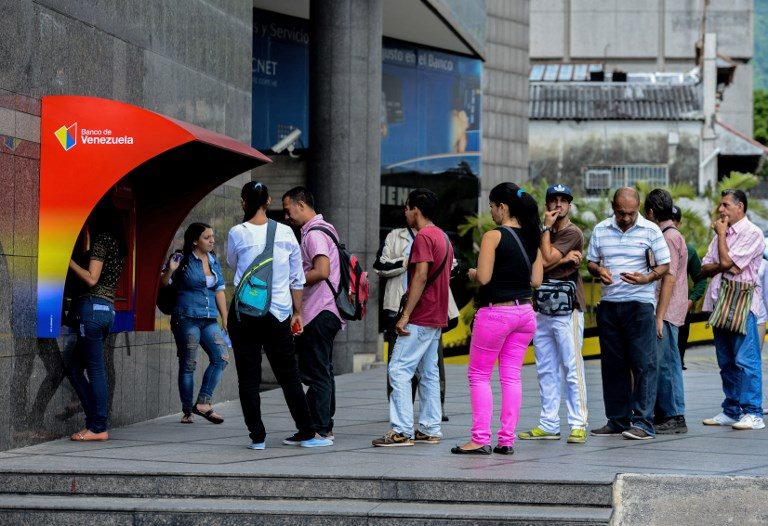SUMMARY
This is AI generated summarization, which may have errors. For context, always refer to the full article.

CARACAS, Venezuela – Venezuela and the jewel of its crude-dependent economy, state oil company PDVSA, were declared in partial default by ratings agencies Tuesday, November 14, but the government insisted it was in the process of paying up.
Standard & Poor’s declared Venezuela in “selective default” after it failed to make $200 million in payments on two global bond issues by the end of a 30-day grace period on November 12.
Fitch meanwhile placed PDVSA in selective default for a week’s delay in the payment of two bonds totaling some $2 billion, which matured November 2 and October 27.
Communications Minister Jorge Rodriguez said Venezuela was already catching up on the payments.
“Today, we have begun interest payments on Venezuela’s foreign debt and last week, PDVSA made its debt interest payments,” he said on state television.
“We pay our debts, despite what the ratings agencies, the US Treasury, the European Union or (US President) Donald Trump say.”
A committee of 15 financial firms meeting in New York meanwhile put off a decision for a third straight day on whether a “Failure to Pay Credit Event” had occurred at PDVSA.
They will reconvene Thursday, November 16, to determine whether holders of PDVSA debt with default insurance – credit default swaps – can collect payment.
PDVSA is vulnerable to creditors potentially moving to seize crude shipments or refinery assets abroad, particularly from its US subsidiary Citgo.
If a selective default spreads to other bond issues, in particular the nation’s $150 billion sovereign debt, the South American country would likely be declared in full default.
A full default – recognition that Venezuela is unable to repay its massive debt – would have enormous consequences for the country, whose population is already suffering severe food and medicine shortages because of a lack of money to import them.
China meanwhile said its massive financing of Venezuela was “proceeding normally”, and Russia was expected to sign an agreement as early as Wednesday to restructure $3 billion of Venezuelan debt, according to sources in Moscow familiar with the matter.
Beijing and Moscow have emerged as Venezuela’s most reliable sources of funding, with China owed $28 billion and Russia $8 billion.
Caracas has less than $10 billion left in hard currency reserves, but must make $1.4 billion in debt payments before year’s end, and another $8 billion next year.
‘No concrete details’
Venezuelan President Nicolas Maduro has formed a commission to restructure Venezuela’s sovereign debt and that of state oil company PDVSA.
But participants in a first meeting in Caracas on Monday, November 13, said officials had come up with no specific proposals.
“They didn’t give any concrete details on their plans, on what they hope to get,” Geronimo Mansutti, from the Rendivalores brokerage, told Agence France-Presse.
S&P said there was “a one-in-two chance that Venezuela could default again within the next three months.”
“We would very likely consider any Venezuelan restructuring to be a distressed debt exchange and equivalent to default given the highly constrained external liquidity,” it said.
About 70% of Venezuelan bondholders are North American, according to government figures.
Vice President Tareck El Aissami blamed US sanctions for delays to Venezuela’s debt repayments.
Restrictions include a ban on US entities buying any new Venezuela debt issues – usually a required step in any restructuring.
The US has designated El Aissami himself a drug kingpin with whom US entities are barred from dealing.
Adding to the pressure on Maduro, the European Union also announced sanctions on Monday.
‘Violent narco-state’
A default can be declared by the major ratings agencies, big debt-holders or the government itself.
Maduro is also under fire internationally for marginalizing the opposition, which controls the legislature, and stifling independent media.
The US called an informal meeting of the UN Security Council, where US Ambassador Nikki Haley slammed Venezuela as an “increasingly violent narco-state” that poses a threat to world security.
Permanent council members Russia and China boycotted.
Venezuela’s envoy to the UN, Rafael Ramirez, called the meeting a “hostile” act of “interference” by the US. – Rappler.com
Add a comment
How does this make you feel?





There are no comments yet. Add your comment to start the conversation.